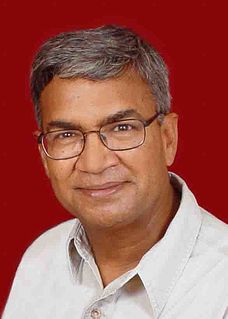
Rudolf Carnap was a German-language philosopher who was active in Europe before 1935 and in the United States thereafter. He was a major member of the Vienna Circle and an advocate of logical positivism. He is considered "one of the giants among twentieth-century philosophers."
In philosophy of science, confirmation holism, also called epistemological holism, is the view that no individual statement can be confirmed or disconfirmed by an empirical test, but rather that only a set of statements can be so. It is attributed to Willard Van Orman Quine who motivated his holism through extending Pierre Duhem's problem of underdetermination in physical theory to all knowledge claims.

Continental philosophy is a term used to describe some philosophers and philosophical traditions that do not fall under the umbrella of analytic philosophy. However, there is no academic consensus on the definition of continental philosophy. Prior to the twentieth century, the term "continental" was used broadly to refer to philosophy from continental Europe. A different use of the term originated among English-speaking philosophers in the second half of the 20th century, who used it to refer to a range of thinkers and traditions outside the analytic movement. Continental philosophy includes German idealism, phenomenology, existentialism, hermeneutics, structuralism, post-structuralism, deconstruction, French feminism, psychoanalytic theory, and the critical theory of the Frankfurt School as well as branches of Freudian, Hegelian and Western Marxist views.

Hans Reichenbach was a leading philosopher of science, educator, and proponent of logical empiricism. He was influential in the areas of science, education, and of logical empiricism. He founded the Gesellschaft für empirische Philosophie in Berlin in 1928, also known as the “Berlin Circle”. Carl Gustav Hempel, Richard von Mises, David Hilbert and Kurt Grelling all became members of the Berlin Circle.
Computational epistemology is a subdiscipline of formal epistemology that studies the intrinsic complexity of inductive problems for ideal and computationally bounded agents. In short, computational epistemology is to induction what recursion theory is to deduction.
Michael Levin is an American philosopher and writer. He is professor emeritus of philosophy at City University of New York. He has published on metaphysics, epistemology, race, homosexuality, animal rights, the philosophy of archaeology, the philosophy of logic, philosophy of language, and the philosophy of science.
Christopher Janaway is a philosopher and author. He earned degrees from the University of Oxford. Before moving to Southampton in 2005, Janaway taught at the University of Sydney and Birkbeck, University of London. His recent research has been on Arthur Schopenhauer, Friedrich Nietzsche and aesthetics. His 2007 book Beyond Selflessness: Reading Nietzsche's Genealogy focuses on a critical examination of Nietzsche's On the Genealogy of Morals. Janaway currently lectures at the University of Southampton, including a module focusing on Nietzsche.

Gregory Wheeler is an American logician, philosopher, and computer scientist, who specializes in formal epistemology. Much of his work has focused on imprecise probability. He is currently Professor of Philosophy and Computer Science at the Frankfurt School of Finance and Management, and has held positions at LMU Munich, Carnegie Mellon University, the Max Planck Institute for Human Development in Berlin, and the New University of Lisbon. He is a member of the PROGIC steering committee, the editorial boards of Synthese, and Minds and Machines, and was the editor-in-chief of Minds and Machines from 2011 to 2016. He obtained a Ph.D. in philosophy and computer science from the University of Rochester under Henry Kyburg.
Evidence for a proposition is what supports this proposition. It is usually understood as an indication that the supported proposition is true. What role evidence plays and how it is conceived varies from field to field.
Lennart Åqvist is a Swedish logician. He was a founding member of the editorial board of the Journal of Philosophical Logic. Åqvist received his PhD from Uppsala University in 1960 and has subsequently worked at Uppsala as Docent of Practical Philosophy. On 5 June 1992 he received an honorary doctorate from the Faculty of Law at Uppsala University, Sweden He is currently a Reader in Practical Philosophy in the College of Law at Uppsala.
The following is a bibliography of Charles W. Morris.
John L. Pollock (1940–2009) was an American philosopher known for influential work in epistemology, philosophical logic, cognitive science, and artificial intelligence.

Susanne Bobzien is a German-born philosopher whose research interests focus on philosophy of logic and language, determinism and freedom, and ancient philosophy. She currently is senior research fellow at All Souls College, Oxford and professor of philosophy at the University of Oxford.
This is a list of philosophical literature articles.
Patrick Aidan Heelan, S.J. was an Irish Jesuit priest, physicist, and philosopher of science. He was William A. Gaston Professor of Philosophy at Georgetown University.

Anil K. Gupta is an Indian-American philosopher who works primarily in logic, epistemology, philosophy of language, and metaphysics. Gupta is the Alan Ross Anderson Distinguished Professor of Philosophy at the University of Pittsburgh. He is also a Fellow of the American Academy of Arts and Sciences. His most recent book, Conscious Experience: A Logical Inquiry, was published by Harvard University Press in 2019.
Jonardon Ganeri, FBA, is a philosopher, specialising in philosophy of mind and in South Asian and Buddhist philosophical traditions. He holds the Bimal Matilal Distinguished Professorship in Philosophy at the University of Toronto. He was Global Network Professor in the College of Arts and Science, New York University, previously having taught at several universities in Britain. Ganeri graduated from Churchill College, Cambridge, with his undergraduate degree in mathematics, before completing a DPhil in philosophy at University and Wolfson Colleges, Oxford. He has published eight monographs, and is the editor of the Oxford Handbook of Indian Philosophy. He is on the editorial board of the Stanford Encyclopedia of Philosophy, the British Journal for the History of Philosophy, Philosophy East & West, Analysis, and other journals and monograph series. His research interests are in consciousness, self, attention, the epistemology of inquiry, the idea of philosophy as a practice and its relationship with literature. He works on the history of ideas in early modern South Asia, intellectual affinities between India and Greece, and Buddhist philosophy of mind, teaches courses in the philosophy of mind, the nature of subjectivity, Buddhist philosophy, the history of Indian philosophical traditions, and supervises graduate students on South Asian philosophical texts in a cross-cultural context. He is a prominent advocate for an expanded role for cross-cultural methodologies in philosophical research, and for enhanced cultural diversity in the philosophical curriculum. Jonardon Ganeri is the inventor of the idea of "cosmopolitan philosophy" as a new discipline within philosophy.
Hamid Vahid-Dastjerdi also known as Hamid Vahid is an Iranian philosopher and Professor of Philosophy and the Head of the Analytic Philosophy Faculty at the Institute for Research in Fundamental Sciences. He is known for his expertise on epistemology, philosophy of mind and philosophical logic. His works have been published in distinguished journals such as Philosophical Studies, Philosophy and Phenomenological Research, Synthese, Erkenntnis, European Journal of Philosophy, Kant-Studien, Metaphilosophy and Ratio.
Dutch philosophy is a broad branch of philosophy that discusses the contributions of Dutch philosophers to the discourse of Western philosophy and Renaissance philosophy. The philosophy, as its own entity, arose in the 16th and 17th centuries through the philosophical studies of Desiderius Erasmus and Baruch Spinoza. The adoption of the humanistic perspective by Erasmus, despite his Christian background, and rational but theocentric perspective expounded by Spinoza, supported each of these philosopher's works. In general, the philosophy revolved around acknowledging the reality of human self-determination and rational thought rather than focusing on traditional ideals of fatalism and virtue raised in Christianity. The roots of philosophical frameworks like the mind-body dualism and monism debate can also be traced to Dutch philosophy, which is attributed to 17th century philosopher René Descartes. Descartes was both a mathematician and philosopher during the Dutch Golden Age, despite being from the Kingdom of France. Modern Dutch philosophers like D.H. Th. Vollenhoven provided critical analyses on the dichotomy between dualism and monism.





